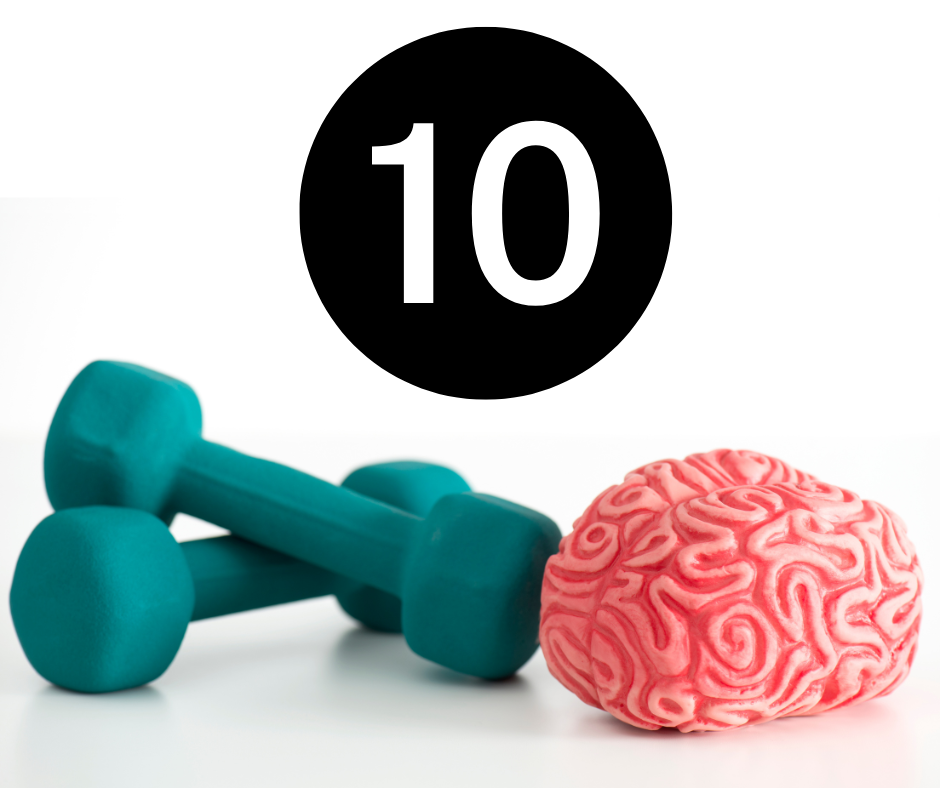Have you seen the Wizard of Oz where the Scarecrow “only wants a brain”? Having a brain was everything for him. The possibilities were endless. By the end of the movie, we all celebrated when he got a brain.
We take our brains for granted. Our body comes with it. It performs all of its miraculous functions without any direction or attention from us. We do have an important role though. From childhood through old age, the brain changes and faces different challenges. Our job is to keep our brain healthy so it can keep regulating ALL the processes in our body.
Some common symptoms of poor brain health are memory problems, trouble concentrating or processing, mood changes, fatigue, confusion and even changes in coordination or balance, headaches, or vision problems.
Here are 10 practical, everyday strategies you can incorporate into your routine that can positively impact your brain’s health, agility, and longevity.
Nutrition: Fuel for the Mind
 A nutritious diet of antioxidants, healthy fats, and vitamins supports brain function. Antioxidant-rich foods are berries, nuts, and leafy greens. They help combat oxidative stress, which is linked to brain aging. Omega-3 Fatty Acids are healthy fats found in fish like salmon and plant sources like flaxseeds are essential for brain development and maintaining cognitive function. Fresh fruits and vegetables are good sources of vitamins.
A nutritious diet of antioxidants, healthy fats, and vitamins supports brain function. Antioxidant-rich foods are berries, nuts, and leafy greens. They help combat oxidative stress, which is linked to brain aging. Omega-3 Fatty Acids are healthy fats found in fish like salmon and plant sources like flaxseeds are essential for brain development and maintaining cognitive function. Fresh fruits and vegetables are good sources of vitamins.
Hydration: Support Your body

Getting enough water every day is important for your health. Water is important because it supports many of our body’s functions. When you don’t drink enough water you can get dehydrated. This can cause unclear thinking, mood changes, cause your body to overheat, and other negative side effects. Aim for at least 8-10 glasses of water daily to keep your brain well-hydrated.
Physical Activity: Exercise Your Brain
Physical activity increases blood flow to the brain, enhancing neuroplasticity (the brain’s ability to form new neural connections), which is crucial for learning and memory. Regular exercise, such as walking, keeps up muscle strength, which has been shown to slow down the effects of aging.
Cognitive Stimulation: Keep Learning
Continuous Learning is beneficial for the brain. Engaging in new learning activities, such as playing musical instruments, learning a new language, or even engaging in challenging puzzles, keeps the brain active and prevents cognitive decline. Social Interaction is also important. Regular socializing stimulates the brain. Conversations and social interactions encourage problem-solving and emotional health, which are vital for cognitive maintenance.
Sleep: Essential for Brain Recovery

When we sleep our brain is performing important functions. That is why it is important to get good quality sleep. Aim for 7-9 hours of sleep per night. Sleep is crucial for memory consolidation, clearing out brain toxins and overall brain health. Establish a regular sleep schedule, reduce blue light exposure before bedtime, and create a restful environment to improve sleep quality.
Mindfulness and Stress Reduction: Protect Your Brain
Practicing mindfulness focuses on the present, where we are, and what we are doing in a non-judgmental way. Mindfulness is not something special, it is something we are already capable of doing, we just need to practice it to get the benefits. Examples are taking short pauses throughout the day to focus on the present. Mindfulness can be part of meditation. Together these give us a greater awareness of our body and our well-being. Daily meditation and mindfulness help reduce stress, improve concentration, and boost mood.
A note about stress: Chronic stress can lead to long-term damage to the brain. Effective stress management techniques such as deep breathing exercises, mindfulness, and hobbies can mitigate these effects.
Digital Detox: Rest Your Mind

How much time do we spend using our digital devices? It is important to prioritize breaks. Limiting screen time helps prevent mental fatigue and promotes healthier sleep habits. Balancing digital life with physical activities and in-person interactions can reduce the risk of cognitive overload.
Regular Check-ups: Monitoring Brain Health
Regular physical health check-ups are essential as overall health impacts brain health. Conditions like hypertension and diabetes can adversely affect cognitive functions.
Neurofeedback Brain Training
Neurofeedback sessions exercise the brain and promote optimal brain function. Neurofeedback takes advantage of the brain’s ability to self-regulate by giving information or feedback about what it’s currently doing. The feedback comes in the form of pauses in the music you listen to during your training session. The brain understands the mathematics behind the timing of the pauses and learns to reorganize itself more efficiently over time. Benefits of neurofeedback brain training range from brain fitness to improved concentration, better stress management, more calm, waking refreshed, and feeling more confident.
Conclusion: A Holistic Approach to Keeping Your Brain Health

Maintaining brain health is important all through your life. Individuals of any age can support their brain health and enhance their quality of life by integrating a balanced diet, regular physical activity, cognitive challenges, proper sleep, mindfulness, and periodic health check-ups. Start incorporating these practices today to reap the benefits of a healthier, sharper mind tomorrow.
These everyday practices can significantly contribute to sustained brain health and cognitive functionality, complementing specific treatments like neurofeedback brain training for a holistic approach to neurological wellness.

